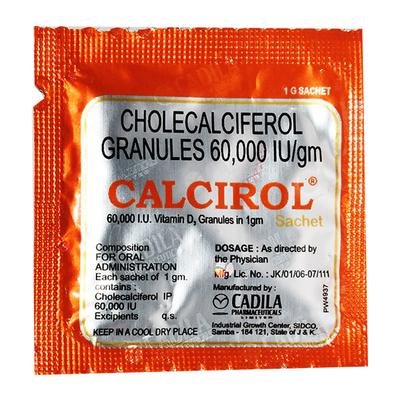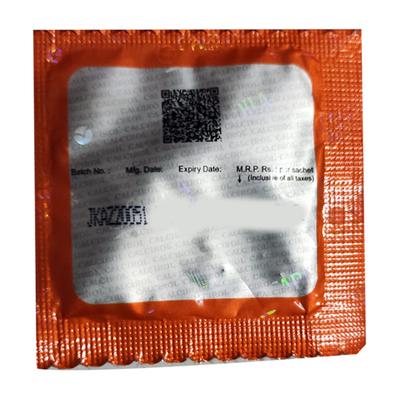

Netmeds First Membership
Quick Links
Introduction About CALCIROL 60000IU GRANULES
Calcirol is a Vitamin D supplement used in the management of conditions such as vitamin D resistant rickets, altered metabolism of vit D and hypoparathyroidism (reduced working of parathyroid gland). It is also used in managing reduced levels of calcium and renal osteodystrophy (skeletal problems) in patients with chronic renal failure undergoing dialysis.
Calcirol is used in conjunction with calcium in the management osteoporosis. This supplementation is also indicated when dietary intake is insufficient. It contains cholecalciferol which helps in maintaining calcium levels in the body.
Vitamin D is mainly responsible for the maintenance of normal levels of phosphorus and serum calcium in the blood by enhancing the efficiency of the small intestine to absorb these minerals from the diet. It also stimulates the processes and increases calcium reabsorption from the kidneys.
Take Calcirol Sachet as advised by your doctor. Take 1 Sachet once a week for 8 weeks followed by 1 Sachet once a month for 6 months. Mix the contents of the Calcirol Sachet in milk or as directed by the physician and consume it. Consult your doctor if you experience any allergic reactions after using it. It is not recommended for use in patients having hypercalcemia, malabsorption syndrome, abnormal sensitivity to the toxic effects of Vitamin D and hypervitaminosis D.
Key Composition
- Cholecalciferol
Therapeutic Uses Of CALCIROL 60000IU GRANULES
- Manage vitamin D resistant rickets, altered metabolism of vit D and hypoparathyroidism
- Manages reduced levels of calcium and renal osteodystrophy (skeletal problems) in patients with chronic renal failure undergoing dialysis
- It is used as an adjuvant to calcium in the management of osteoporosis
- It is used when dietary intake of calcium is not sufficient
Side Effects Of CALCIROL 60000IU GRANULES
Calcirol may cause weakness, fatigue, excessive sleep, headache, anorexia, dry mouth, metallic taste, nausea, vomiting, vertigo, tinnitus, ataxia (disturbed coordination, balance, and speech), hypotonia (decreased muscle tone) in some individuals. Consult your doctor if you notice any such side effects while taking Calcirol.
Safety Advice
- Always take Calcirol as advised by your physician.
- Take 1 Sachet once a week for 8 weeks followed by 1 Sachet once a month for 6 months, or as directed by the physician.
- Mix the contents of the Calcirol Sachet in milk or as directed by the physician and consume it.
- Do not use if you are allergic to any of its components.
- Pregnant and breastfeeding women must consult their doctor before taking this medicine
- Your doctor will decide the correct dose and duration of Calcirol for your child depending upon your child’s age, condition, and body weight. Ask for your doctor’s advice before giving to your child
- Calcirol is not recommended for use in patients having hypercalcemia, malabsorption syndrome, abnormal sensitivity to the toxic effects of Vitamin D and hypervitaminosis D.
- Inform your doctor on all the medicines you use, including prescription, over-the-counter medications, and herbal supplements
More Information
- Keep Calcirol Sachet out of the reach and sight of children
- Store at room temperature
FAQs About CALCIROL 60000IU GRANULES
Q: What is Calcirol and why is it prescribed?
A: Calcirol is a vitamin D supplement used in the management of conditions such as vitamin D-resistant rickets, altered vitamin D metabolism, and hypoparathyroidism (reduced working of the parathyroid gland). It is also used to manage reduced levels of calcium and renal osteodystrophy (skeletal problems) in patients with chronic renal failure undergoing dialysis. Calcirol is used in conjunction with calcium in the management of osteoporosis. This supplementation is also indicated when dietary intake is insufficient.
Q: How do I take Calcirol?
A: Always take Calcirol as advised by your physician. Calcirol can be taken dissolved in milk or water. Empty the contents of the sachet into a glass of milk or water and consume it. Ask for your physician’s advice before taking.
Q: What is the best time to take Calcirol—morning or night?
A: Vitamin D is thought to interfere with sleep. It may cause sleep disturbances. Therefore, it is better to take Calcirol in the morning with a healthy breakfast. However, consult with your doctor once.
Q: Should Calcirol be taken with or without meals?
A: Calcirol contains vitamin D, which is a fat-soluble vitamin. It gets better absorbed in the body when taken with high-fat foods; hence, it is advised to take it with meals to make its absorption better.
Q: Can Calcirol be given to children?
A: It is safe to use Calcirol in children. Your doctor will decide the correct dose and duration for your child depending upon your child’s age, condition, and body weight. Ask for your doctor’s advice before giving it to your child.
Q: How does Calcirol work?
A: Calcirolcontains a vitamin D supplement, which is mainly responsible for the maintenance of normal levels of phosphorus and serum calcium in the blood by enhancing the efficiency of the small intestine to absorb these minerals from the diet. It also stimulates processes and increases calcium reabsorption from the kidneys.
Q: What happens if more Calcirol is consumed?
A: If you or anyone else accidentally swallows more than the recommended dose, do not panic, as it is unlikely to cause any serious harm. You may experience stomach upset.
Q: Can I take Calcirol during pregnancy?
A: Calcirolis not recommended for use in pregnant women unless considered necessary by the physician.
Q: Who should not take Calcirol?
A: Calcirol is not recommended for use in patients with hypercalcemia, malabsorption syndrome, abnormal sensitivity to the toxic effects of vitamin D, or hypervitaminosis D.
Q: What are the common side effects of Calcirol?
A: Calcirol may cause weakness, fatigue, excessive sleep, headache, anorexia, dry mouth, metallic taste, nausea, vomiting, vertigo, tinnitus, ataxia (disturbed coordination, balance, and speech), and hypotonia (decreased muscle tone) in some individuals. Consult your doctor if you notice any such side effects while taking Calcirol.
Q: How frequently should I take Calcirol?
A: Always take Calcirol as advised by your physician. Take 1 Sachet once a week for 8 weeks, followed by 1 Sachet once a month for 6 months, or as directed by the physician. Do not exceed the recommended dosage.
References
- DBOOST®. Capsules/Sachet. Vitamin D3 (cholecalciferol). [Accessed on 25th September 2025]

- Mohammad Shafi Kuchay, Ganesh Sudhakar Jevalikar, Ambrish Mithal, Sunil Kumar Mishra, Navin Dang. Efficacy and safety of a single monthly dose of cholecalciferol in healthy school children. NIH. National Library of Medicine. Pubmed [Revised in April 2016] [Accessed on 27th September 2025]








